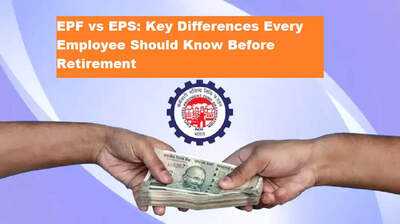Understanding EPF and EPS: Two Pillars of Financial Security for Employees
When it comes to long-term financial security, two government-backed schemes — the Employees’ Provident Fund (EPF) and the Employees’ Pension Scheme (EPS) — play a vital role for salaried professionals in India. Both are designed to ensure financial stability after retirement, but they differ significantly in purpose, contribution, and benefits. Let’s break down how EPF and EPS work, their key differences, and how they can shape your retirement planning.
What is EPF?The Employees’ Provident Fund (EPF) is one of India’s most trusted retirement savings schemes, managed by the Employees’ Provident Fund Organisation (EPFO). It is mandatory for employees working in establishments covered under the EPF Act.
In this scheme, both the employee and employer contribute 12% each of the employee’s basic salary plus dearness allowance every month. The amount collected in the EPF account earns interest — currently around 8.25% per annum — and is completely tax-free.
The accumulated balance, including interest, can be withdrawn either after retirement, during unemployment, or in specific emergencies like medical needs, home purchase, or higher education. Thus, EPF serves as a long-term savings tool that helps employees build a financial cushion for the future.
What is EPS and How Does It Differ from EPF?The Employees’ Pension Scheme (EPS), also managed by EPFO, is designed to provide a regular pension income after retirement. Unlike EPF, employees do not contribute directly to EPS. Instead, the employer diverts 8.33% of the salary (from their EPF contribution) to the pension fund, while the remaining portion goes to the EPF account.
To qualify for pension benefits under EPS, an employee must have completed at least 10 years of service and reach the age of 58 years. The pension amount depends on the employee’s pensionable salary and total years of service.
Another key advantage of EPS is its family coverage — in case of the employee’s demise, the nominee or family member continues to receive a pension, ensuring long-term financial support.
Interest, Tax, and Withdrawal RulesThe EPF offers interest on the accumulated balance, which is tax-exempt under Section 80C of the Income Tax Act. Withdrawals before completing five years of service, however, may attract tax implications.
On the other hand, EPS does not earn any interest, as it functions more like a social security pension system. The payout is monthly, based on eligibility, and cannot be withdrawn in a lump sum except under certain limited conditions (like early exit before completing 10 years of service).
Thus, EPF helps you grow your retirement corpus, while EPS ensures a steady income after retirement.
Which One is Better for You?Both EPF and EPS serve different but complementary purposes. The EPF focuses on building a retirement fund through savings and interest, giving you the flexibility to withdraw funds when needed. Meanwhile, EPS guarantees a lifelong monthly pension, offering financial stability during post-retirement years.
An ideal retirement plan should include both EPF and EPS, as they balance liquidity and security. Together, they ensure that employees have a lump sum amount at the time of retirement and a steady income stream for their later years.
Final TakeawayThe EPF and EPS are essential components of India’s social security framework for employees. While EPF supports long-term wealth creation, EPS acts as a safety net providing guaranteed income during retirement.
Before retirement, understanding how these two schemes work — and how to optimize contributions — can help employees make smarter financial decisions, ensuring peace of mind and economic independence in their golden years.
You may also like

Gurbaz, Ibrahim Shine As Afghanistan Complete 3-0 T20I Series Sweep Over Zimbabwe

Bihar polls: PM Modi holds road show in Patna, CM Nitish Kumar absent

Why Is Masoor Dal Considered Non-Vegetarian in Hindu Beliefs? The Lesser-Known Mythological Reason

Gauhati HC Chief Justice lauds Mizoram CM Lalduhoma for strengthening state judiciary

Kane Williamson announced his retirement just before the T20 World Cup, dealing a major blow to New Zealand.







